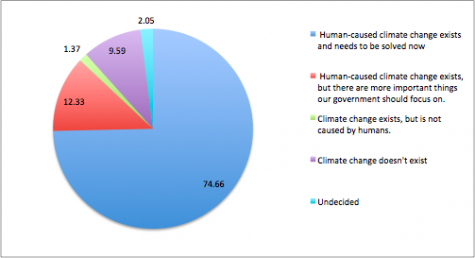Letter to the Editor
May 7, 2019
Dear Editors of tjTODAY,
As TJ’s Environmental Impact Club, we sincerely thank you for putting climate change at the forefront of your March 2019 issue. However, given the pressing nature of this topic, we want to address the false equivalencies portrayed by your article “Hotly Contested Climate Change”.
First and foremost, what is false equivalency? ‘False equivalency’ occurs when two opposing arguments are portrayed as logically equal even when they are not. Say the Washington Post decides to write an article about the effects of smoking on health. In an effort to appear unbiased, the Washington Post interviews an expert who believes smoking is bad for health AND a tobacco executive who believes smoking is harmless.
In the case of this article, we do not have an issue with including the perspectives of climate change deniers. Our issue lies in misrepresenting the thoughts of the TJ community: this article providing greater representation to students who were skeptical of the current scientific consensus on climate change than those who weren’t. Based on data collected from our survey of 146 students, here are TJ’s true opinions about climate change:

In total, 88 % of our respondents agreed that average global temperatures are rising significantly and 87% attributed this change to human practices. Although this is not a consensus like that found in the scientific community, the issue of climate change in the TJ community is far from “hotly-contested” as stated in this article. Furthermore, even though 75% of the TJ community believes that “Human-caused climate change exists and needs to be solved now”, only 3 of the 7 students who were interviewed provided answers consistent with this statement.
Our concern is that this article legitimizes doubts about the scientific consensus of climate change without capturing the evidence to support it as well. The concept of climate change and the greenhouse effect date back to observations made by scientists such as John Tyndall and Svante Arrhenius during the 19th century, and was supported by substantial amounts of evidence until the scientific community came to a consensus on the issue in the 1990s.
In a time when the entire scientific community and the majority of TJHSST and the American public believe we should act, and the UN’s Intergovernmental Panel on Climate Change gave the world 11 years to avoid the consequences of a climate disaster, the real question we should be asking is not whether we should act, but how.
Would a carbon tax and increased environmental regulations be a good idea? Should we focus on making fossil fuels more efficient or transitioning to renewable energy? What role should controversial techniques such as nuclear energy and geoengineering play in this fight?
These are the questions we need to be asking if we are to stop climate change. Although your article did briefly address this issue, we urge tjTODAY and all TJHSST students explore this topic further. As a school focused on the sciences, it is our job to be knowledgeable about this topic and lead the charge against climate change as the next generation of scientists.
Sincerely,
TJHSST Environmental Impact Club





